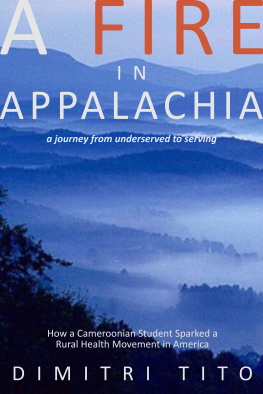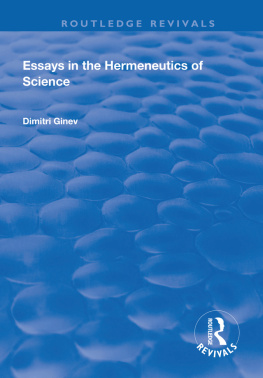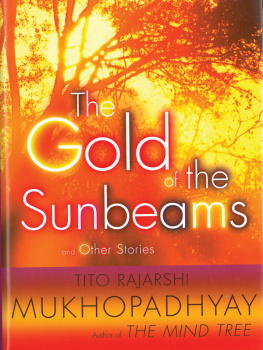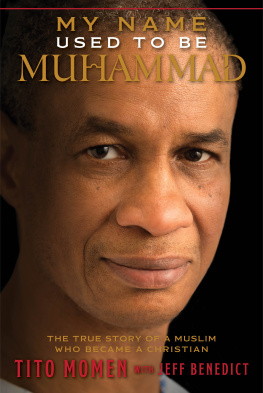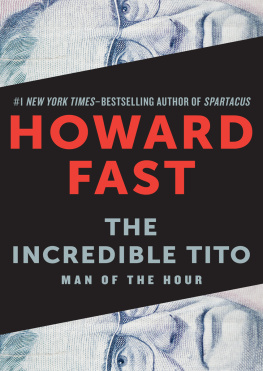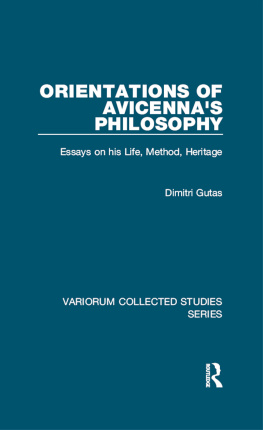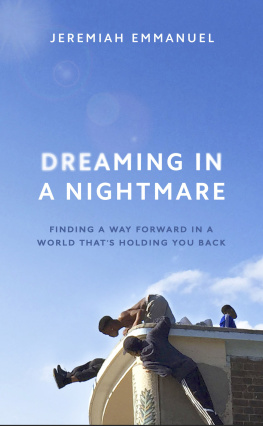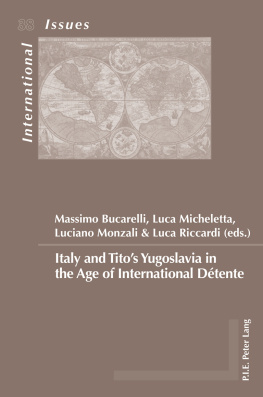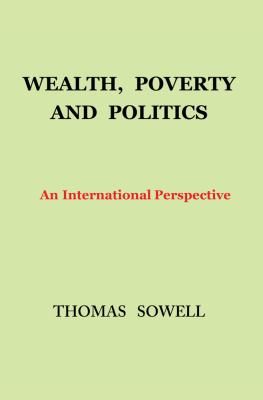A Fire in Appalachia
Dimitri Tito
Published by Dimitri Tito, 2020.
While every precaution has been taken in the preparation of this book, the publisher assumes no responsibility for errors or omissions, or for damages resulting from the use of the information contained herein.
A FIRE IN APPALACHIA
First edition. March 3, 2020.
Copyright 2020 Dimitri Tito.
ISBN: 978-1393199182
Written by Dimitri Tito.
10 9 8 7 6 5 4 3 2 1
Contents
In Loving Memory ofMenkep Ndjogang Jean MarcVivien FokoJeanne Nouteka
A FIRE
IN
APPALACHIA
A journey from underserved to serving
How a Cameroonian Student Sparked a
Rural Health Movement in America
DIMITRI TITO
2020 by Emmanuel Dimitri Foko Tito
All rights reserved. No portions of this book may be reproduced, stored in a retrieval system, or transmitted in any form or by any meanselectronic, mechanical, photocopy, recording, scanning, or otherexcept for brief quotations in critical reviews or articles, without the prior written permission of the publisher.
Any Internet addresses, phone numbers, or company or product information printed in this book are offered as a resource and are not intended in any way to be or to imply an endorsement by those resources, nor does Emmanuel Dimitri Foko Tito vouch for the existence, content, or services of these sites, phone numbers, companies, or products beyond the life of this book.
In Loving Memory of
Menkep Ndjogang Jean Marc
Vivien Foko
Jeanne Nouteka
Introduction
My name is Emmanuel Dimitri Foko Tito, and I was born in Douala, Cameroon, the wealthiest place on Earth. Does that surprise you? What did you think of when you read the word Cameroon just now? Be honest with yourself; no one is here to judge you, and whatever your thoughts, you are likely to be in good company. If you are like most people from around the developed world, the first thing to come to your mind may have been the words developing country or third world. You might be picturing malnourished children begging on dusty streets, seemingly parentless, their ribs showing out through taut skin, their lips cracked and dry.
Or maybe you pictured hordes of fierce, ebony-skinned warriors, bedecked in armor made of bones, ornamented with feathers. You see their faces painted in crimson, no doubt the blood of virgins stolen from some rival tribe. They stamp the butts of their spears and shriek out their deafening battle cry.
Or perhaps you see a barren desert where lines of nomadic tribes wander the dunes looking for water, their shaman leaders casting goat knuckles and whispering incantations to the sun god for guidance as their people thirst.
Or you may simply picture poverty, abject poverty, whatever that looks like to you.
You are not correct, but as I said before, you are not alone.
When I came to the United States, most of the people I encountered thought something like the above, and while I have to admit, I was offended by this more than once, I now know that it was not their fault, none of them. They, perhaps like you, had been conditioned to think that way since they were young. If you watch a Hollywood movie with a setting in Africa, this is likely how it will have been portrayed. Or, if a missionary doing work in Africa approaches your church, they will likely describe something like this before your pastor sends the plates out for an extra offering. You may have even seen the skeletal frame of a child staring back at you from your lunch cafeteria milk carton. Surely, Africa must be all of those things and more, and since Cameroon is a country in Africa, it must be all of those things too, right?
It is true that Cameroon is a country in Africa, and no, it does not have the material wealth of places that you might call developed or first world. And there is no doubt that it has its own set of diverse challenges; well discuss some of them in this book and why I ultimately decided to come to the United States. But one thing Cameroon is not is poor. Cameroon has a wealth which no hardship is strong enough to touch. You see, Cameroon is not just a country in Africa. Cameroon is a family of millions, and there is nothing more valuable than family.
But family has to be chosen. In life, we always have a choice. We can choose to hoard what we have, or we can choose to share. We can choose to ignore others hardships, or we can choose to help lift them out of them. We can choose to make our lives about self, or we can choose to make them about others. From my earliest memories, and even before then, I have been blessed by those who gave, who loved, who inspired, who helped, who made their lives about others. And because of this, though I was born into a country riddled with poverty and all of its effects, I never thought I was poor. I always lived in the abundance of the heart, the abundance of community, the abundance of family. I was wealthy.
My name is Dimi, but I also go by Square Root, Sena, or Posterchild, but well get into that later. I was born in Kotto, a densely populated residential area on the outer edges of Douala, the economic center of Cameroon in Central Africa. That year, in 1994, the average income in Cameroon was only one thousand six hundred dollars per person. That year, Cameroon was the 26th poorest country on the poorest continent in the world, and yet, if you had asked meor any of my four siblings, or our parents, or our friends, or anyone else that I knewwe would have all told you the same thing, we have plenty.
Growing up, I would travel to the U.S., learn English, study Biomedical Engineering and later Medicine. And through that, I would have the opportunity to help so many people in the same way that I have been helped in my lifeby sharing what I have. I want to tell you that story. I want to tell you a story, not of overcoming great challenges or diving deep into the depths of personal struggle, only to rise back up even stronger. Those are good stories and make great books, but many others have told those stories, and they are not mine. My story is a simple one. It is a story of how one can accomplish anything if they set the right motivations before them. It is the story of how anyone, no matter how humble their beginnings, can grow into whatever end they desire, so long as they do not forget the lessons of their youth. It is the story of giving, loving, inspiring, helping. It is the story of making life about others. It is the story of being a part of a bigger family. And finally, it is the story about how a tiny spark was nurtured into a great flame.
Chapter One
Mercy
Douala is where I was born, and that is where I lived with my family until I was sixteen years old. My family was pretty normal, if not on the smaller side for Cameroonthere were only five of us kids. I had two older brothers, Landry and Wilfried, then came me. After that was my one younger brother, Jordan, and then Nora. As the youngest and only sister, Nora has never been in trouble in the entire course of her life.
Our fathers name is Emmanuel, and his father was Emmanuel before him. And actually, all of my siblings are named Emmanuel as well. Like me they go by their middle names, or a truncation thereofthats why I go by Dimi. And our mother is Isabelle.
That made seven of us in our small house, though we all felt like our family extended much beyond that, down the many streets, alleyways, and paths of our neighborhood.
Douala is like most large cities in Africa, aging infrastructure left behind by the various European empires that had called it their own in the centuries and decades past. Its main roads stretch across the city and out into the countryside in a patchwork of asphalt, and the rest of the streets and alleys are either crumbling, have crumbled, or were never paved to begin with. Drainage infrastructure only serves the most important travelways. For the rest, rain gathers and runs off into natural furrows and gullies of its own creation much like it has across every terrain since rain has existed.

